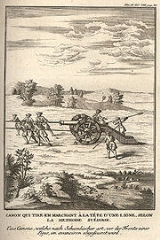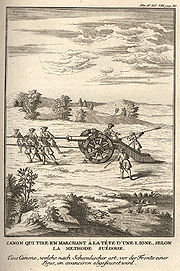
Jean Charles, Chevalier Folard
Encyclopedia
Jean Charles, Chevalier Folard (February 13, 1669–1752), French soldier and military author, was born at Avignon
.
His military ardour was first awakened by reading Caesar
's Commentaries, and he ran away from home and joined the army. He soon saw active service, and, young as he was, wrote a manual on partisan warfare, the manuscript of which passed with Folard's other papers to Marshal Belleisle on the author's death.
In 1702 he became a captain, and aide-de-camp
to the duke of Vendôme
, then in command of the French forces in Italy. In 1705, while serving under Vendôme's brother, the Grand Prior
, Folard won the Cross of St. Louis for a gallant feat of arms, and in the same year he distinguished himself at the battle of Cassano
, where he was severely wounded. It was during his tedious recovery from his wounds that he conceived the tactical theories to the elucidation of which he devoted most of his life.
In 1706 he again rendered good service in Italy, and in 1708 distinguished himself greatly in the operations attempted by Vendôme and the duke of Burgundy
for the relief of Lille
, the failure of which was due in part to the disagreement of the French commanders; and it is no small testimony to the ability and tact of Folard that he retained the friendship of both. Folard was wounded at the battle of Malplaquet
in 1709, and in 1711 his services were rewarded with the governorship of Bourbourg
.
He saw further active service in 1714 Malta
, under Charles XII of Sweden
in the north, and under the duke of Berwick
in the short Spanish War of 1719
. Charles XII he regarded as the first captain of all time, and it was at Stockholm
that Folard began to formulate his tactical ideas in a commertary on Polybius
. On his way back to France he was shipwrecked and lost all his papers, but he set to work at once to write his essays afresh, and in 1724 appeared his Nouvelles D'dcouvertes sur la guerre dans une dissertation de Polybe, followed (1727–1730) by Histoire de Polybe traduite par . . . de Thuillier avec un commentaire de M. de Folard, Chevalier de l'Ordre de St Louis. Folard spent the remainder of his life in answering the criticisms provoked by the novelty of his theories. He died friendless and in obscurity at Avignon in 1752.
 An analysis of Folard's military writings brings to light not a connected theory of war as a whole, but a great number of independent ideas, sometimes valuable and suggestive, but far more often extravagant. The central point of his tactics was his proposed column formation for infantry. Struck by the apparent weakness of the thin line of battle of the time, and arguing from the cuneus of ancient warfare, he desired to substitute the shock of a deep mass of troops for former methods of attack, and further considered that in defence a solid column gave an unshakable stability to the line of battle. Controversy at once centred itself upon the column. While some famous commanders such as Marshal Saxe
An analysis of Folard's military writings brings to light not a connected theory of war as a whole, but a great number of independent ideas, sometimes valuable and suggestive, but far more often extravagant. The central point of his tactics was his proposed column formation for infantry. Struck by the apparent weakness of the thin line of battle of the time, and arguing from the cuneus of ancient warfare, he desired to substitute the shock of a deep mass of troops for former methods of attack, and further considered that in defence a solid column gave an unshakable stability to the line of battle. Controversy at once centred itself upon the column. While some famous commanders such as Marshal Saxe
and Guido Starhemberg
approved it and put it in practice, the weight of military opinion throughout Europe was opposed to it, and eventually history justified this opposition. Among the most discriminating of his critics was Frederick the Great, who is said to have invited Folard to Berlin. The Prussian king certainly caused a prcis to be made by Colonel von Seers, and wrote a preface thereto expressing his views. The work (like others by Frederick) fell into unauthorized hands, and, on its publication (Paris, 1760) under the title Esprit du Chev. Folard, created a great impression.
----
Avignon
Avignon is a French commune in southeastern France in the départment of the Vaucluse bordered by the left bank of the Rhône river. Of the 94,787 inhabitants of the city on 1 January 2010, 12 000 live in the ancient town centre surrounded by its medieval ramparts.Often referred to as the...
.
His military ardour was first awakened by reading Caesar
Julius Caesar
Gaius Julius Caesar was a Roman general and statesman and a distinguished writer of Latin prose. He played a critical role in the gradual transformation of the Roman Republic into the Roman Empire....
's Commentaries, and he ran away from home and joined the army. He soon saw active service, and, young as he was, wrote a manual on partisan warfare, the manuscript of which passed with Folard's other papers to Marshal Belleisle on the author's death.
In 1702 he became a captain, and aide-de-camp
Aide-de-camp
An aide-de-camp is a personal assistant, secretary, or adjutant to a person of high rank, usually a senior military officer or a head of state...
to the duke of Vendôme
Louis Joseph, duc de Vendôme
Louis Joseph de Bourbon, Duke of Vendôme was a French military commander during the War of the Grand Alliance and War of the Spanish Succession, Marshal of France.-Biography:...
, then in command of the French forces in Italy. In 1705, while serving under Vendôme's brother, the Grand Prior
Philippe de Vendôme
Philippe de Bourbon, Duke of Vendôme the "Grand Prior" was the fourth Duke of Vendôme and Grand Prior for France in the Order of Malta, a French army commander and the younger brother of Louis Joseph, duc de Vendôme....
, Folard won the Cross of St. Louis for a gallant feat of arms, and in the same year he distinguished himself at the battle of Cassano
Battle of Cassano (1705)
The Battle of Cassano, fought on 16 August 1705, was a hard fought battle in the Italian theatre of the War of the Spanish Succession.Both sides suffered serious casualties, but the French were victorious.-The battle:...
, where he was severely wounded. It was during his tedious recovery from his wounds that he conceived the tactical theories to the elucidation of which he devoted most of his life.
In 1706 he again rendered good service in Italy, and in 1708 distinguished himself greatly in the operations attempted by Vendôme and the duke of Burgundy
Duke of Burgundy
Duke of Burgundy was a title borne by the rulers of the Duchy of Burgundy, a small portion of traditional lands of Burgundians west of river Saône which in 843 was allotted to Charles the Bald's kingdom of West Franks...
for the relief of Lille
Lille
Lille is a city in northern France . It is the principal city of the Lille Métropole, the fourth-largest metropolitan area in the country behind those of Paris, Lyon and Marseille. Lille is situated on the Deûle River, near France's border with Belgium...
, the failure of which was due in part to the disagreement of the French commanders; and it is no small testimony to the ability and tact of Folard that he retained the friendship of both. Folard was wounded at the battle of Malplaquet
Battle of Malplaquet
The Battle of Malplaquet, fought on 11 September 1709, was one of the main battles of the War of the Spanish Succession, which opposed the Bourbons of France and Spain against an alliance whose major members were the Habsburg Monarchy, Great Britain, the United Provinces and the Kingdom of...
in 1709, and in 1711 his services were rewarded with the governorship of Bourbourg
Bourbourg
Bourbourg is a commune in the Nord department in northern France. It is situated in the maritime plain of northern France, at the heart of a triangle formed by Dunkirk, Calais, and Saint-Omer.-Heraldry:-Historical sites:...
.
He saw further active service in 1714 Malta
Malta
Malta , officially known as the Republic of Malta , is a Southern European country consisting of an archipelago situated in the centre of the Mediterranean, south of Sicily, east of Tunisia and north of Libya, with Gibraltar to the west and Alexandria to the east.Malta covers just over in...
, under Charles XII of Sweden
Charles XII of Sweden
Charles XII also Carl of Sweden, , Latinized to Carolus Rex, Turkish: Demirbaş Şarl, also known as Charles the Habitué was the King of the Swedish Empire from 1697 to 1718...
in the north, and under the duke of Berwick
James FitzJames, 1st Duke of Berwick
James FitzJames, 1st Duke of Berwick, 1st Duke of Fitz-James, 1st Duke of Liria and Jérica was an Anglo-French military leader, illegitimate son of King James II of England by Arabella Churchill, sister of the 1st Duke of Marlborough...
in the short Spanish War of 1719
War of the Quadruple Alliance
The War of the Quadruple Alliance was a result of the ambitions of King Philip V of Spain, his wife, Elisabeth Farnese, and his chief minister Giulio Alberoni to retake territories in Italy and to claim the French throne. It saw the defeat of Spain by an alliance of Britain, France, Austria , and...
. Charles XII he regarded as the first captain of all time, and it was at Stockholm
Stockholm
Stockholm is the capital and the largest city of Sweden and constitutes the most populated urban area in Scandinavia. Stockholm is the most populous city in Sweden, with a population of 851,155 in the municipality , 1.37 million in the urban area , and around 2.1 million in the metropolitan area...
that Folard began to formulate his tactical ideas in a commertary on Polybius
Polybius
Polybius , Greek ) was a Greek historian of the Hellenistic Period noted for his work, The Histories, which covered the period of 220–146 BC in detail. The work describes in part the rise of the Roman Republic and its gradual domination over Greece...
. On his way back to France he was shipwrecked and lost all his papers, but he set to work at once to write his essays afresh, and in 1724 appeared his Nouvelles D'dcouvertes sur la guerre dans une dissertation de Polybe, followed (1727–1730) by Histoire de Polybe traduite par . . . de Thuillier avec un commentaire de M. de Folard, Chevalier de l'Ordre de St Louis. Folard spent the remainder of his life in answering the criticisms provoked by the novelty of his theories. He died friendless and in obscurity at Avignon in 1752.

Maurice, comte de Saxe
Maurice de Saxe was a German in French service who was Marshal and later also Marshal General of France.-Childhood:...
and Guido Starhemberg
Guido Starhemberg
Guido Wald Rüdiger, count of Starhemberg; was an Austrian military officer.He was a cousin of Ernst Rüdiger von Starhemberg , the famous commander of Vienna during the Turkish siege of 1683, and acted as his ADC during the siege...
approved it and put it in practice, the weight of military opinion throughout Europe was opposed to it, and eventually history justified this opposition. Among the most discriminating of his critics was Frederick the Great, who is said to have invited Folard to Berlin. The Prussian king certainly caused a prcis to be made by Colonel von Seers, and wrote a preface thereto expressing his views. The work (like others by Frederick) fell into unauthorized hands, and, on its publication (Paris, 1760) under the title Esprit du Chev. Folard, created a great impression.
----

